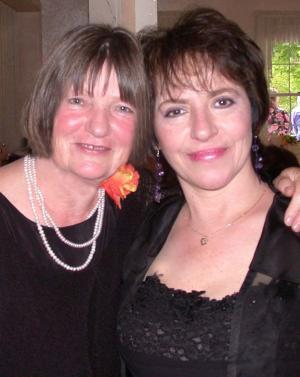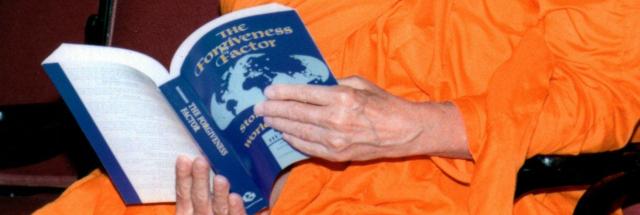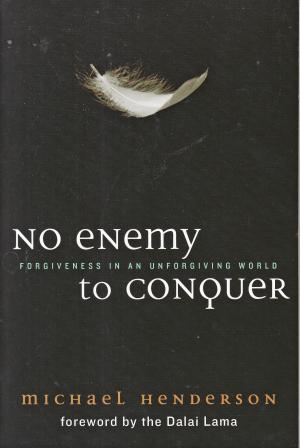Stories
Germany: Meeting the monsters of my dreams
South Africa: After the Heidelberg Tavern Massacre
Sierra Leone: No thirst for revenge
The following story from chapter 2 of No Enemy To Conquer appeared in ‘Children in War – the International Journal of Evacuee and War Child Studies’ Vol 1, no 6 February 2009
Germany: Meeting the monsters of my dreams
Zella and Helga are best friends. Two middle-aged women, traveling together, talking about their children and grandchildren, and the pills they each take for migraines; all very normal. But should they be doing this? Some have difficulty accepting their friendship.
 They are co-founders of an organization called One By One, Inc that takes its name from a book about the Holocaust by Judith Miller. Miller wrote, “We must remind ourselves that the Holocaust was not six million. It was one, plus one, plus one…Only in understanding that civilized people must defend the one, by one, by one…can the Holocaust, the incomprehensible, be given meaning.”
They are co-founders of an organization called One By One, Inc that takes its name from a book about the Holocaust by Judith Miller. Miller wrote, “We must remind ourselves that the Holocaust was not six million. It was one, plus one, plus one…Only in understanding that civilized people must defend the one, by one, by one…can the Holocaust, the incomprehensible, be given meaning.”
Members of One By One are children of victims of Nazi atrocities who grew up in the shadow of their parents suffering and trauma, and descendants of the Nazi era whose parents or grandparents were perpetrators or bystanders in one of the most evil chapters of human history. They seek out the humanity in each other as they listen with compassion to one another’s stories of pain, guilt, anguish, loss and fear. As the stories resound within them, the women say, the burdens are lightened and the the impact of their legacies is transformed, offering hope to future generations.
The path of transformation is never easy, and the stories of Zella and Helga are testimony to that.
The following story comes from chapter 2 of No Enemy To Conquer
South Africa: After the Heidelberg Tavern Massacre
The Heidelberg Tavern massacre was described by the Amnesty Committee of South Africa’s Truth and Reconciliation Commission (TRC) as “brutal.” On New Year’s Eve 1993, the Azanian People’s Liberation Army (APLA), the armed wing of the Pan Africanist Congress (PAC), carried out this attack on a Cape Town restaurant on the orders of APLA’s director of operations, Letlapa Mphahlele, now PAC president. Many were particularly shocked as it happened at a time when the date for democratic elections had already been set for April 1994.
One of the four people killed was twenty-three-year-old white student, Lyndi Fourie, who was just finishing her civil engineering degree. Her mother, Ginn, a university lecturer, says of Mphahlele, “If I had met him then, I could have killed him with my bare hands.”
Yet today Ginn Fourie and Letlapa Mphahlele share platforms in South Africa and around the world, speaking of reconciliation after tragedy through the Lyndi Fourie Foundation.
The following story comes from chapter 4 of No Enemy to Conquer
Sierra Leone: No thirst for revenge
Revenge was John Bangura’s deepest desire.
His Sierra Leone village had been burned down. There had been a massacre, with nine family members killed, and to this day he does not know what happened to his sister or to his closest friends. “I was fuelled with a lot of hate,” he says. “I was willing to do whatever I could to seek revenge, not so much on the rebels, for I could have been one of them. I was angry at the leaders who laid the foundations of the war, and had the money and the means to get out of the country. In my thirst for revenge my intention was to join other Sierra Leoneans in the Diaspora with a similar state of mind to work out a master plan for this mission.”
Sadly, Bangura’s traumatic experiences have been shared by thousands in Sierra Leone, a West African country made up of 60% Muslims, 30% Christians and 10% people of indigenous beliefs, as they suffered a ten-year civil war.
In 1991 the Sierra Leone Revolutionary United Front (RUF) launched a bush war against what they felt was the corrupt and inefficient government in the capital, Freetown. The following year there was a military coup. Bangura, a businessman who felt that any kind of military government would be a disaster, joined in opposing the new regime. It was then that his village was destroyed and family members killed. He managed to get his wife and children to safety and finally he had to escape to Europe. He was not to return home for nine years.
He had the necessary visas and expected to be able to join relatives in the United States. But, as he discovered, appeals for political asylum have to be made in the first foreign country reached, in this case Denmark. For 23 months under immigration control he was well looked after, staying in a Red Cross refugee camp as his case was investigated. A local clergyman, Torben Juul Christensen, befriended him.


